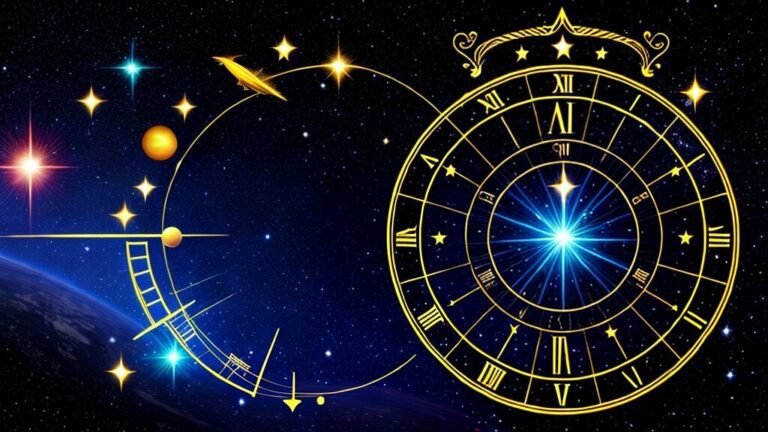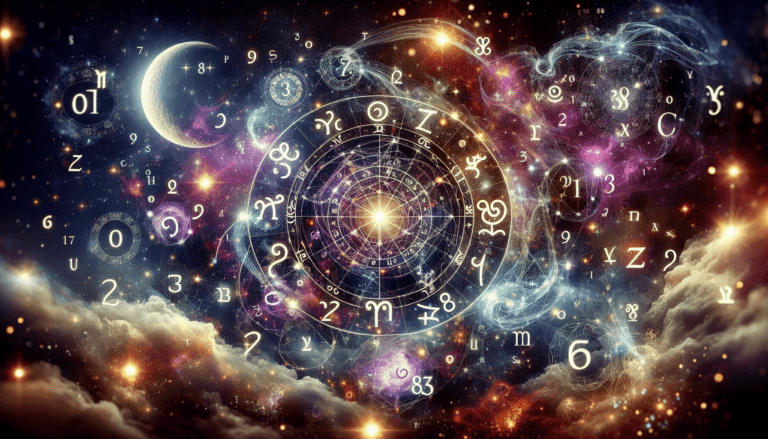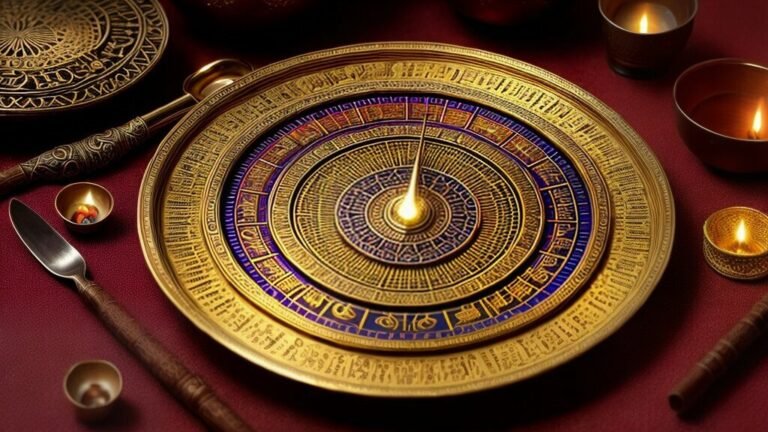How to Predict Death in Astrology: Unveil Life’s Mysteries
Have you ever wondered whether astrology holds the key to understanding the mysteries of life and death? For centuries, people have turned to astrology to predict and interpret life events, including death. Astrology has been used as a tool to provide insights into the potential fate and destiny of individuals, and to help them make informed decisions.
In this article, we will dive deep into the world of death prediction in astrology, exploring the various techniques and methods used to predict death, as well as the ethical considerations and validation methods required to make accurate predictions.
Key Takeaways:
- Astrology is believed to offer insights into various aspects of life, including death
- There are different astrological methods and techniques used to predict death, including analyzing key planets and houses, transits and progressions, and dasha systems
- Individual birth chart analysis, planetary aspects, and the astrologer’s interpretation skills are all crucial factors in making accurate predictions
- Ethical considerations include the responsibility of astrologers in handling sensitive information and providing guidance and support
- Validating astrological predictions related to death requires a holistic approach that involves considering medical factors, personal circumstances, and other relevant aspects
The Role of Astrology in Predicting Death
Astrology has long been associated with offering insights into different aspects of life, including death. Many astrologers believe that through analyzing the positions of celestial bodies in a birth chart, they can predict potential timelines for death.
There are various astrological methods and techniques used to predict death, with different planets and houses playing a significant role in providing insights into this life-changing event.
The Specifics of Astrological Death Predictions
The primary astrological factors that are analyzed when it comes to predicting death are the planetary placements, aspects, and transits in a birth chart. These factors are believed to offer insights into potential life-changing events, including death.
For instance, the 8th house and the planets that occupy it, such as Saturn and Pluto, are often associated with death, as well as hidden knowledge and transformation. Additionally, the presence of malefic planets such as Mars and Saturn in certain positions and aspects can indicate potential health issues that may lead to death.
Astrologers also analyze progressions and transits to make death predictions. By looking at the positions and aspects of planets in the future, astrologers can predict potential life-changing events, including death.
Interpreting the Signs
However, accurate death predictions require a skilled astrologer to interpret these signs and symbols accurately. Birth chart analysis is an essential part of the process, as astrologers need to consider various factors, including planetary aspects, placements, and transits, alongside individual circumstances and medical history.
Additionally, understanding the ethics of the practice is crucial. The astrologer must approach the subject with sensitivity and empathy, providing guidance and support rather than creating unnecessary fear and anxiety.
Overall, astrology plays a significant role in predicting death. By analyzing different astrological factors and understanding the interpretation of birth charts, skilled astrologers can provide insights into potential life-changing events, including death.
Key Planets and Houses in Death Prediction
When it comes to predicting death in astrology, specific planets and houses play a crucial role. The placement and aspects of these celestial bodies in a birth chart can provide important insights into potential timelines for death.
One of the key planets associated with death is Saturn. Its placement in the eighth house, which is often referred to as the house of death, can indicate a transformative event in one’s life, including death. Additionally, the planet Mars can also indicate violent or sudden deaths when placed in challenging aspects with other planets.
The eighth house is also significant in death prediction in astrology. This house represents transformation, regeneration, and rebirth. Its placement, aspects, and the planets residing in it can offer insights into the potential timing and circumstances of death.
Example of Key Planets and Houses in Death Prediction:
| Planet | House | Aspect |
|---|---|---|
| Saturn | 8th house | Challenging aspects with Mars, Uranus, or Pluto |
| Mars | 8th house | Square, opposition, or conjunction with Saturn, Uranus, or Pluto |
Overall, understanding the role of specific planets and houses in death prediction can provide valuable insights into one’s life path and potential challenges. However, it is important to remember that astrology should be used as a tool for self-discovery and growth, rather than a definitive means of predicting death.
Analyzing Transits and Progressions for Death Prediction
When it comes to predicting death in astrology, transits and progressions play a significant role. These are astrological tools that enable astrologers to pinpoint potential life-changing events, including death.
Transits refer to the current positions of the planets in the sky and their relationship with the planets in your birth chart. When certain transiting planets make significant aspects or alignments with planets in your birth chart, it can trigger life-changing events or experiences, including death.
Similarly, progression involves analyzing the relationship between the current positions of planets in your birth chart and their positions at various stages in your life. Progressions provide insight into the underlying developments and growth patterns that occur over a person’s life cycle, including potential life-threatening situations.
What to Look For in Transits and Progressions
When analyzing transits and progressions for potential death predictions, astrologers look for specific patterns and planetary placements that may indicate such an event. Some of the key factors that astrologers consider include:
| Planetary Aspects | House Placements | Birth Chart Relationships |
|---|---|---|
| Transits and progressions involving Pluto, Saturn, Neptune, or Uranus, as these planets are commonly associated with death and transformation. | The house placements of the aforementioned planets, as well as the 8th and 12th house, which are also associated with death and transformation. | Relationships between the planets and houses, such as harsh aspects between the 8th house and Pluto, or between Pluto and Saturn. |
It’s important to note that these patterns and placements are not definitive indicators of death, but rather potential warning signs that warrant further investigation.
Interpreting Transits and Progressions for Death Prediction
When it comes to interpreting transits and progressions for potential death predictions, it’s crucial to take a holistic approach. Astrologers must consider the individual’s medical history, personal circumstances, and other relevant factors to make an accurate prediction.
It’s also important to provide guidance and support to the individual instead of instilling fear and anxiety. Astrology can be a valuable tool for self-awareness and growth, and its insights can be used to navigate life’s challenges with greater understanding and confidence.
The Role of Dasha Systems in Death Prediction
Dasha systems are an integral part of Vedic astrology and can provide valuable insights into potential life-threatening situations, including death.
The dasha system is based on the position of the moon and divides an individual’s life into different periods, each ruled by a specific planet. These periods can last from a few months to several years, depending on the length of the dasha.
In Vedic astrology, the dasha period ruling the eighth house, also known as the house of death, is of particular significance when it comes to predicting death.
During this period, the individual may be more susceptible to accidents, disease, or other life-threatening events. However, it is important to keep in mind that other factors, such as the placement of planets in the birth chart and their aspects, also play a crucial role in predicting death.
Astrologers analyze these dasha periods in conjunction with other astrological factors to make predictions related to death. They interpret the dasha periods based on the individual’s birth chart and personal circumstances to provide guidance and support during potentially challenging times.
It is important to note that while dasha systems can offer valuable insights into potential life-changing events, they are not absolute predictors of death. Astrology is a tool for self-discovery and guidance, and should not be used to instill fear or anxiety.
Factors Influencing Death Predictions
When it comes to predicting death in astrology, there are several factors that can influence the accuracy of the predictions. While astrology can provide valuable insights into our lives, it’s important to remember that it’s just one tool among many, and should be used in conjunction with other factors.
Individual birth chart analysis is crucial in predicting death in astrology. The placement of certain planets, such as Saturn and Mars, and their aspects to other planets can indicate potential timelines for death. However, it’s important to remember that each individual birth chart is unique, and interpretations must be tailored to each individual.
Additionally, the astrologer’s interpretation skills can greatly influence the accuracy of the prediction. An experienced astrologer who understands the intricacies of birth chart analysis and can interpret its various elements accurately will be more likely to make accurate death predictions.
Finally, it’s important to remember that astrology isn’t an exact science, and predictions should be viewed as potential outcomes rather than definitive truths. Other factors, such as medical conditions and personal circumstances, can influence the timing and nature of death, and should be taken into consideration alongside astrological insights.
The Role of Ethics in Death Prediction
When it comes to predicting death in astrology, ethical considerations play a vital role. As an astrologer, you are responsible for handling sensitive information that can have profound effects on an individual’s mental and emotional well-being. Therefore, it is imperative to approach this subject with utmost care and consideration.
One of the primary ethical considerations is the responsibility to provide guidance and support instead of fostering fear and anxiety. Astrology should be utilized as a tool for self-discovery and personal growth, rather than a means to frighten individuals with predictions of death.
It is also essential to maintain confidentiality and handle information with discretion. Birth charts contain personal information that should only be shared with the client. As an astrologer, you should be respectful of the client’s privacy and ensure that any information shared remains confidential.
Furthermore, it is crucial to acknowledge the limitations of astrology in predicting death. While astrology can provide insights and suggestions, it is not a definitive means of predicting death. It is only one of the many factors that one should consider when it comes to life-threatening situations.
In conclusion, predicting death in astrology requires ethical considerations and a responsible approach. As an astrologer, it is imperative to handle sensitive information with discretion and provide guidance and support rather than instilling fear and anxiety. By approaching this topic with care and consideration, astrology can be a powerful tool for self-discovery and personal growth.
Validating Astrological Predictions of Death
Validating astrological predictions related to death is crucial to ensure accuracy and avoid spreading unnecessary fear and anxiety. While astrology can offer valuable insights into potential life-changing events, including death, it is important to approach it from a holistic perspective that considers all relevant factors.
One way to validate death predictions is to consult with medical professionals and take into account any health-related concerns or predispositions. Additionally, analyzing the individual’s personal circumstances, such as occupation, lifestyle, and relationships, can provide further clarity on potential risks and influences.
It is also important to consider the specific astrological techniques and methods used to make the predictions. Astrologers who rely solely on one technique or overlook important planetary aspects and placements may not provide accurate predictions. Therefore, seeking multiple opinions from qualified astrologers can provide a more comprehensive understanding of potential outcomes.
While astrology can provide valuable insights, it is essential to remember that it is not a definitive means of predicting death or other life events. Utilize astrology as a tool for self-discovery and guidance rather than relying solely on it for making life-altering decisions.
Conclusion
Death prediction in astrology is a complex and intriguing topic that requires a deep understanding of astrological methods and techniques. As you have learned, specific planets and houses, transits and progressions, and dasha systems can all offer valuable insights into potential timelines for death. However, it is important to approach such predictions with caution, as many factors can influence their accuracy.
It is essential to validate astrological predictions related to death by considering medical information, personal circumstances, and other relevant aspects. Ultimately, astrology should be used as a tool for self-discovery and guidance, rather than a means of predicting the future with certainty.
Ethical considerations
It is crucial for astrologers to handle sensitive information responsibly and provide support and guidance to clients, rather than fostering fear and anxiety. When it comes to predicting death, the ethical considerations are even more important. It is essential to approach such predictions with compassion and empathy, considering the feelings and emotional states of the clients.
As you explore the intricacies of astrology and death prediction, keep in mind that astrology is a powerful tool that can provide valuable insights into life’s mysteries. Use it wisely and respectfully.
FAQ
Q: How can astrology be used to predict death?
A: Astrology is believed to offer insights into various aspects of life, including death. Different astrological methods and techniques are used to predict death and understand its significance in astrological predictions.
Q: What are the key planets and houses in death prediction?
A: Specific planets and houses in astrology play a crucial role in predicting death. The placement and aspects of these celestial bodies in a birth chart can indicate potential timelines for death.
Q: How do transits and progressions contribute to death prediction?
A: Transits and progressions are important factors in predicting death in astrology. By analyzing the movement of planets over time, astrologers can gain insights into potential life-changing events, including death.
Q: What is the significance of dasha systems in death prediction?
A: Dasha systems are significant in predicting death in astrology. Different dasha periods can indicate potential life-threatening situations, and astrologers interpret these periods to make predictions related to death.
Q: What factors influence death predictions in astrology?
A: Several factors can influence death predictions in astrology, including individual birth chart analysis, planetary aspects, and the astrologer’s interpretation skills. These elements are crucial in making accurate predictions related to death.
Q: What ethical considerations are there in death prediction?
A: Ethical considerations in death prediction involve handling sensitive information responsibly. Astrologers have a responsibility to provide guidance and support rather than fostering fear and anxiety when discussing predictions related to death.
Q: How can astrological predictions of death be validated?
A: Validating astrological predictions related to death requires a holistic approach. This involves considering medical factors, personal circumstances, and other relevant aspects alongside astrological insights to ensure accurate predictions.





